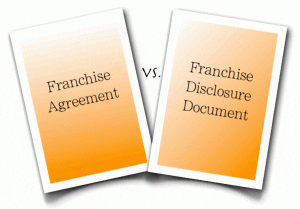
Franchising uses many confusing terms, and you may be wondering what is a franchise agreement vs FDD? What exactly is a Franchise Agreement? And how does it differ from a Franchise Disclosure Document (or FDD)?
The short answer is: a signature page.
A franchise agreement is a legally-binding contract between a franchisor and a franchisee. It clearly spells out all terms and provisions of the parties’ obligations to one another. Signing a franchise agreement means quite simply that you have just officially become a franchisee!
Franchise Disclosure Document (FDD)
The FDD, formerly known as a UFOC (Uniform Franchise Offering Circular), contains the word “offering.” This is essentially what this document contains: the details of what precisely the franchisor is offering you, if you become a franchisee.
Written in fairly easy-to-understand language for a lay person, an FDD explains what you’re entitled to, and what obligations you must accept. For example, it will reveal whether or not you need to materially participate in the business. It tells you what types of royalties you will pay, whether or not you will need to purchase specific items from the franchisor, the duration or term of your franchise, the conditions for renewing, and so on.
The FDD also includes vital statistics about the franchisor or parent company. This includes their financial records, whether or not they’ve declared bankruptcy or had judgements against them, how many franchises are operating and how many may have failed, etc.
Franchise Agreement
The franchise agreement, on the other hand, written in formal legalese, spells out the exact terms that you, specifically, as the franchisee must agree to.
For example, the FDD tells you the minimum territory you will receive. In some cases, the FDD states this in terms of a mile radius; in others, it lists this as a minimum population. You receive the FDD, and you review it. You should be able to read it on your own, but you can certainly get an attorney or other trusted advisor to help you. During this process, you may be able to negotiate the specifics of your territory of interest. Once you reach an agreement, the franchisor will make you a formal offer to be a franchisee by issuing you a franchise agreement.
Your franchise agreement will list your specific territory, typically with a boundary map drawn out. By using this example, you can see that the FDD is like a template. It shows you the general provisions of owning this franchise. The franchise agreement contains exact specifics, tailored to your location and terms.
How to Read a Franchise Agreement
That’s easy: hire a lawyer and ask him to explain it.
Actually, joking aside, it’s always a good idea to hire an attorney when reviewing any contract. Most franchise agreements have a term of either five or ten years. When you’re making that type of a commitment, and dealing with a long document such as a franchise agreement written in legal terminology, an attorney’s fee is money well spent to ensure that you’re getting exactly what you expect.
Make sure your attorney has experience reading franchise agreements. He or she needs to know exactly what to look for. You yourself should look for these details and clauses upon reviewing the FDD. Some examples include the following:
- Hidden or additional fees such as training or territory fees
- Provisions under which you can terminate the franchise agreement
- Situations that allow the franchisor to terminate the franchise agreement
- Requirements that you purchase goods from the franchisor
- Ongoing fees for additional training or management
- Terms for renewing your franchise agreement
- Your ability to transfer the franchise to another party
- Provisions that you gross a specific amount of sale
- Restrictions on your ability to hire and fire employees
- Details of the quality and quantity of service and support you are to receive
Summary: Franchise Agreement vs FDD
In summary, a well-written Franchise Disclosure Document should prepare you for exactly what to expect in a franchise agreement. When you tell the franchisor that you accept the terms of the FDD, you aren’t actually agreeing to anything – or at least nothing enforceable – you’re simply giving the franchisor the green light to draft and send you the franchise agreement.
That’s the puppy with the signature page. You’re required by law to wait fourteen days before signing the franchise agreement. Plenty of time to get some sage advice from a trusted attorney so you can feel 100% wonderful about owning your new business.
If you’re interested in viewing the Zoom Room FDD (which contains the full Franchise Agreement within its pages), please request franchise info with this quick form in order to begin the process.
